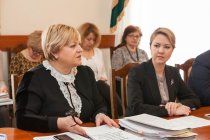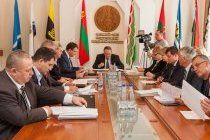 Русский
Русский English
English-







Legislative plans for the beginning of spring
Members of the Presidium of the Parliament determined with the agendas of the upcoming plenary sessions in the course of the traditional meeting. It is scheduled for March 20 and 27. The legislations, planned for consideration were presented in blocks of responsible committees.
Among those examined was the legislative initiative of the Parliament Speaker Alexander Korshunov on changing some provisions of the law “On Personal Income Tax”. Its purpose is to establish a fair approach to the taxation of personal income tax in respect of partially returned funds from the purchase price. We are talking about making transactions in a cashless form - “cashback”.
The explanation of this new word for our everyday life is given in legal language in the explanatory note. So, “this service is that individuals, holders of plastic cards (pension, standard, credit), paid for goods, works, services in the trade and service organizations of partners, receive partial refund of cash funds to a current account in the amount of a percentage of the purchase, determined in the cooperation agreement for the provision of a “cashback” concluded between the bank and the trade and service organization”.
Currently, under the current legislation, banks are required to withhold personal income tax upon cashback payments. That is why the author of the law-in-draft proposes, in order to stimulate sales, increase customer loyalty, promote banking services, to legislatively fix the norm according to which income taxable income does not include material benefits received from banks and organizations engaged in the sale of goods, provision of services, and performance of work , for payment of goods, works, services in a cashless way using bank cards or their details. This will contribute to a wider distribution of non-cash payments.
The tax theme is continued in the legislative initiative of parliamentarian Yuri Kucherenko. He proposes to supplement the law “On the Basics of the Tax System in Pridnestrovian Moldavian Republic” with a new standard. It is allowed to open an additional current account in rubles of the PMR to organizations for each specific project (program) of technical assistance for the duration of its implementation. At the same time, the people's representative supposes that additional current accounts in Pridnestrovian rubles can be opened only in an authorized bank, in which a current account is opened with a legal entity.
The head of the parliamentary committee on economic policy, budget and finance, Oleg Vasilaty, submitted a draft law on amendments to the law “On the budget system in Pridnestrovian Moldavian Republic”. The document was developed in order to establish the maximum amount of local budget expenditures for the maintenance of local governments and state administration at the level of the main financial legislative act of the state.
The legislative initiative of the government, aimed at introducing amendments and addenda to the Code on Administrative Offenses, concerns the establishment of powers to draw up protocols for violating the rules for controlling quarantine, especially dangerous and dangerous pests of plants, plant pathogens, and weed plants. Now they are endowed with employees of the State Supervision Service of the Ministry of Justice, namely, officials of the bodies exercising state phytosanitary control (supervision). In 2014, they drafted 33 protocols on administrative offenses, in 2015 - 50, in 2016 - 27, in 2017 - 26, in total for this period - 136 protocols. For comparison, in the period from January 1, 2010 to December 31, 2013, when internal affairs officers were engaged in this, 756 such protocols were drawn up. In this connection, the government proposes to additionally determine the persons who are entitled to draw up protocols for this kind of offense. namely, officials of the internal affairs bodies. In addition, the law-in-draft proposes the transfer of authority for the consideration of cases on these administrative offenses from the State Supervision Service to the jurisdiction of administrative commissions under the state administrations of cities (districts).




